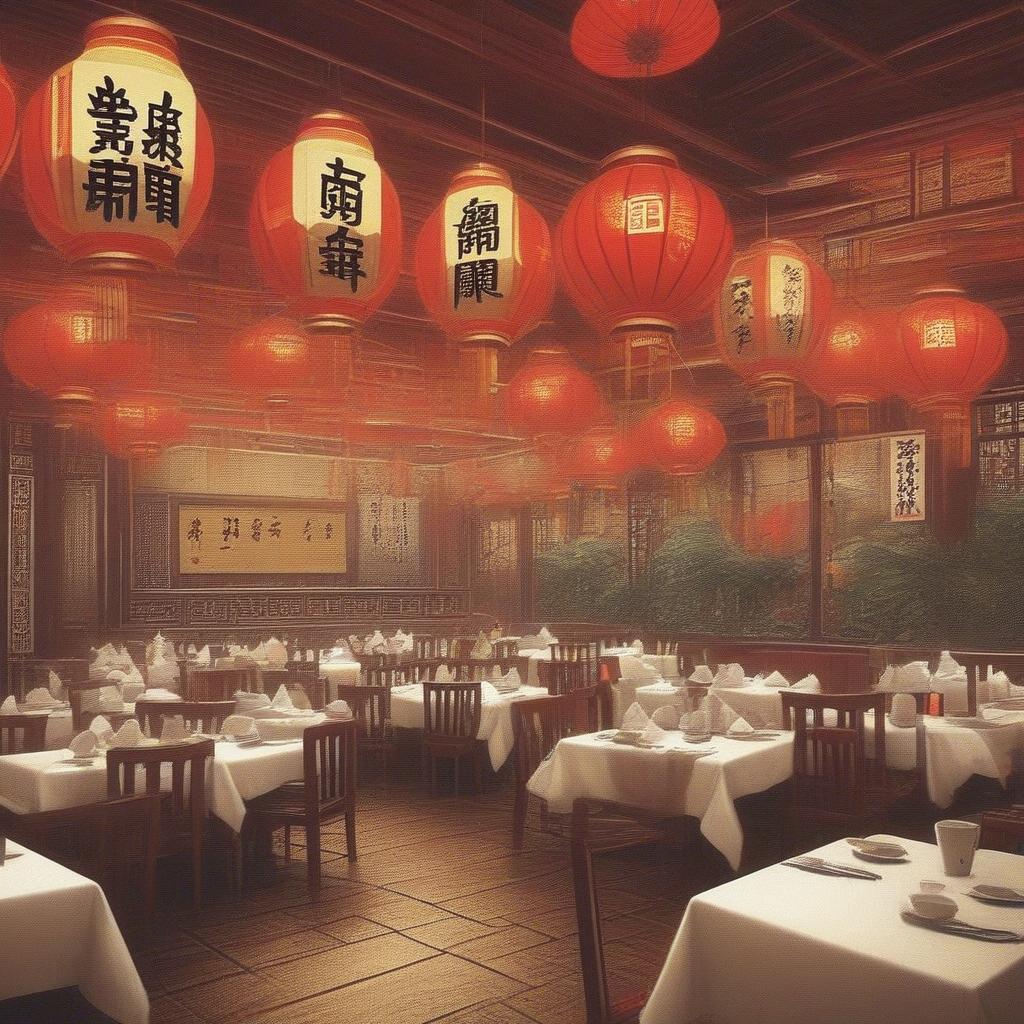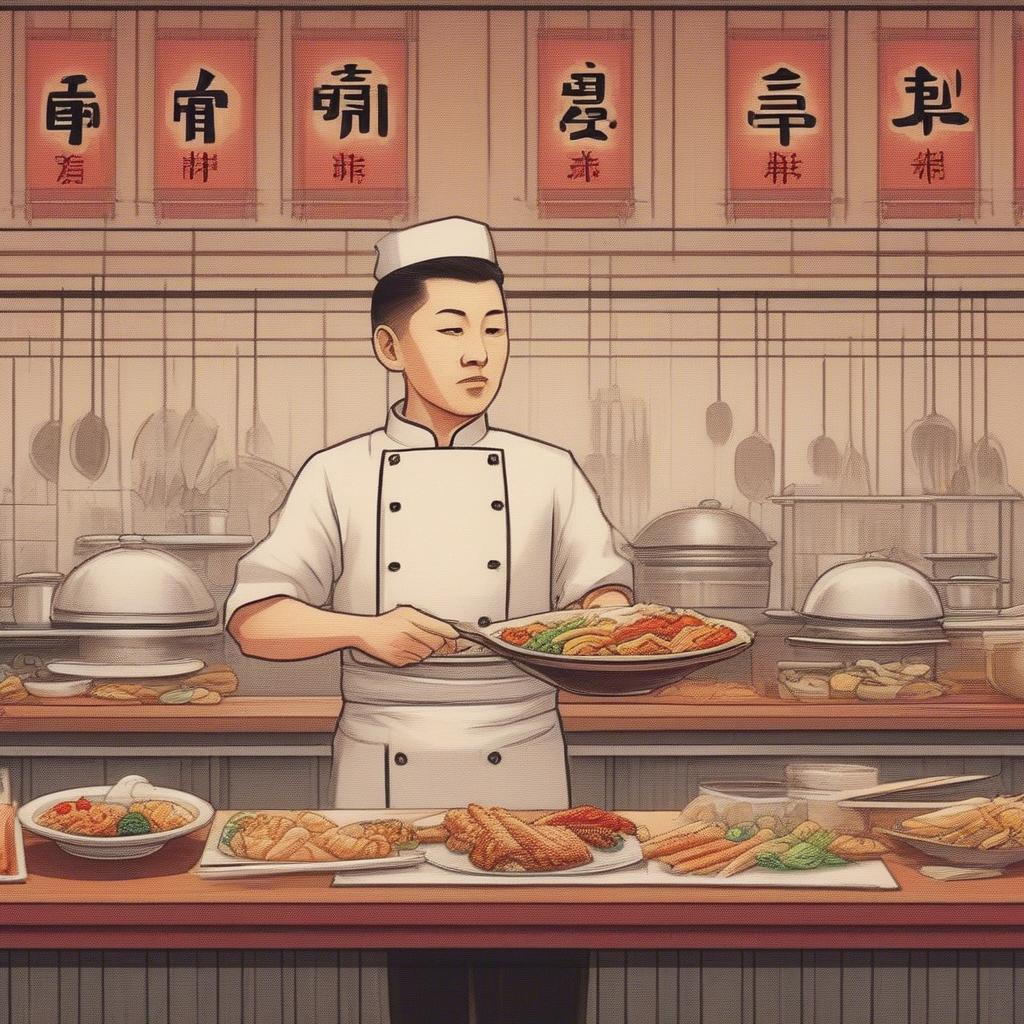
Running a successful Chinese restaurant is more than just having delicious food; it’s about having a well-oiled machine where every team member plays a vital role. The right team structure can elevate your restaurant from good to exceptional, ensuring smooth operations, happy customers, and a thriving business. This article delves into the five essential positions every Chinese restaurant needs for success, exploring what each role entails, why it’s important, and how to build your dream team.
1. The Head Chef: The Culinary Heart of Your Restaurant
The Head Chef is the soul of your Chinese restaurant. This individual isn’t just a cook; they’re the culinary artist, the guardian of flavor, and the driving force behind the dishes that will keep customers coming back for more.
What the Head Chef Does
- Menu Creation and Development: The Head Chef is responsible for crafting the menu, balancing traditional Chinese flavors with modern culinary trends. This involves not just selecting dishes, but also developing recipes, sourcing ingredients, and ensuring each dish is of the highest quality. They should be adept at creating a menu that caters to your specific target audience, balancing popular staples with unique offerings.
- Food Preparation and Execution: This goes beyond just following recipes; the Head Chef oversees the entire cooking process, ensuring consistency in flavor and presentation. They are the expert in Chinese cooking techniques and should be able to train and guide their kitchen staff to maintain those standards. They often take charge of complex or high-volume orders and are meticulous about quality control.
- Kitchen Management: A significant aspect of this role is managing the kitchen team, including scheduling, training, and performance management. The Head Chef must maintain a clean, organized, and efficient kitchen environment, upholding safety and hygiene standards at all times. They’re also responsible for inventory management, ensuring that the kitchen has all the necessary ingredients and supplies.
- Cost Control and Efficiency: A skilled Head Chef understands the importance of cost management. They work to minimize waste, optimize ingredient usage, and identify ways to improve kitchen efficiency without compromising food quality. They also contribute to menu pricing, taking into account food costs and market prices to ensure profitability.
Why is the Head Chef Essential?
- Culinary Excellence: Their expertise and passion for food are what make your Chinese cuisine truly special. They create and maintain the high standards your restaurant needs to thrive. Without a skilled chef, your restaurant’s reputation for flavor will suffer.
- Consistency: Customers expect the same quality and taste with every visit. The Head Chef’s role is to ensure that each dish is consistent and of the highest quality, building trust and loyalty. Consistency is key to brand reputation.
- Operational Efficiency: A well-run kitchen is essential for speed and efficiency. The Head Chef is at the heart of these operations, leading the team and making sure everything runs smoothly. A well-managed kitchen means less waste and better profits.
Tips for Finding the Perfect Head Chef
- Experience Matters: Look for candidates with extensive experience in Chinese cuisine, specifically focusing on the style of cooking your restaurant specializes in.
- Passion and Creativity: A chef who is passionate and creative will constantly bring new and exciting ideas to the menu. They’ll be driven to improve and innovate.
- Leadership Skills: The ability to lead and motivate a team is crucial. They need to be able to train and guide their staff while also being fair and firm.
- Check References: Verify references to make sure that the chef has a track record of delivering on promises. Talking to past employers provides valuable insights.
- Practical Trial: Have potential candidates create a few of your signature dishes during the interview process. This is the best way to truly evaluate their skills.
2. The Restaurant Manager: The Orchestrator of the Dining Experience
The Restaurant Manager is the glue that holds everything together, responsible for the smooth operation of the entire restaurant from the front of house to the back. This role is about more than just logistics; it’s about creating a positive and welcoming environment for both staff and customers.
What the Restaurant Manager Does
- Daily Operations Oversight: From opening to closing, the manager oversees the day-to-day operations. This includes managing staff schedules, ensuring adequate staffing levels, handling customer service issues, and ensuring the restaurant is clean, organized, and welcoming.
- Staff Management: The manager hires, trains, and supervises all front-of-house staff. They cultivate a positive work environment, encourage teamwork, and provide feedback to improve performance. They also handle conflict resolution and ensure everyone is following protocol.
- Customer Experience: They’re deeply committed to providing excellent customer service. They train the staff to handle customer needs efficiently and address complaints in a timely and professional manner. They often personally interact with customers to ensure satisfaction.
- Financial Management: The manager monitors sales, manages cash flow, and tracks expenses. They create and maintain budgets, and work to maximize profits. This involves understanding the financials of the business and making data-driven decisions.
- Marketing and Promotion: Often they are involved in marketing efforts, such as creating promotional campaigns, special events, and managing online reputation. They work to attract new customers and maintain existing relationships.
- Compliance and Regulations: They ensure that the restaurant adheres to all health, safety, and licensing regulations. They are responsible for keeping the restaurant compliant with the law.
Why is the Restaurant Manager Essential?
- Smooth Operations: A well-organized manager ensures smooth daily operations, creating a seamless experience for both customers and staff. Without them, the restaurant would be chaotic.
- Excellent Customer Experience: The manager’s leadership and commitment to service are critical to ensuring customers have a positive dining experience, increasing the chances they will return. Happy customers are repeat customers.
- Efficient Staff Management: They create a positive and motivated team, leading to lower turnover and improved productivity. They’re essential in building a strong and cohesive team.
- Profitability: Their control over costs, sales, and expenses directly impacts the restaurant’s profitability. They help ensure financial success by making sound financial decisions.
Tips for Finding the Perfect Restaurant Manager
- Leadership Experience: Look for someone with prior experience managing a restaurant or similar service-oriented business. They should demonstrate strong leadership and motivational skills.
- Customer Service Focus: They should have a customer-first attitude and a deep understanding of what creates an excellent dining experience. They should be naturally welcoming and approachable.
- Organizational Skills: The ability to handle multiple tasks, prioritize effectively, and maintain an organized work environment is crucial. They must be meticulous in their approach to management.
- Problem-Solving Abilities: They should be able to think on their feet, handle unexpected situations calmly, and resolve problems quickly. The ability to stay calm under pressure is essential.
- Financial Acumen: Basic understanding of restaurant financials, including budgeting, cost control, and pricing strategies. Financial awareness ensures sustainability.
3. The Server/Wait Staff: The Face of Your Restaurant
The servers or wait staff are the front-line representatives of your Chinese restaurant, interacting directly with customers and significantly impacting their overall dining experience. They’re the first and last impression, making them a crucial component of your team.
What the Server/Wait Staff Does
- Greeting and Seating Customers: They warmly welcome guests, guide them to their tables, and provide menus. They set the stage for a great dining experience from the moment customers enter the restaurant.
- Taking Orders and Providing Recommendations: They take orders accurately and are knowledgeable about the menu, offering recommendations to enhance customer choices. They should be able to describe dishes, explain ingredients, and offer helpful suggestions.
- Serving Food and Beverages: They deliver food and drinks promptly and efficiently, ensuring accuracy and attention to detail. Presentation and timing are also key elements.
- Handling Customer Requests and Addressing Concerns: They respond to customer requests with a positive attitude, address concerns promptly, and ensure customer satisfaction. They need to be problem-solvers and great communicators.
- Table Maintenance and Cleanliness: They keep tables clean, organized, and properly set, making sure the dining area looks inviting and neat. They also clear and reset tables quickly and efficiently.
- Processing Payments: They accurately process payments, handle cash and credit card transactions, and ensure proper closing procedures.
Why is the Server/Wait Staff Essential?
- Customer Experience: Their interaction with customers plays a significant role in the overall satisfaction. Great service leads to positive feedback, repeat customers, and strong word-of-mouth referrals.
- Menu Promotion: They can actively promote dishes, specials, and higher-margin items, contributing directly to sales and profitability. Knowledgeable staff can significantly increase average spend per customer.
- Restaurant Ambiance: They create a welcoming, warm, and hospitable environment, making guests feel comfortable and valued. They set the tone for the entire dining experience.
- Operational Efficiency: They help ensure smooth operation during busy hours, making sure that service is quick, efficient, and accurate. Efficient service reduces wait times and keeps the flow moving.
Tips for Finding the Perfect Server/Wait Staff
- Personality and Communication Skills: Look for individuals who are friendly, outgoing, and have excellent communication skills. They should be naturally welcoming and enjoy interacting with people.
- Professionalism and Etiquette: They should be professional, presentable, and have a good understanding of restaurant etiquette. Maintaining a polished and professional image is essential.
- Menu Knowledge: Ensure they learn the menu inside and out, being able to describe ingredients, preparation methods, and make suggestions. Knowing the menu thoroughly is essential.
- Attention to Detail: They should be detail-oriented, ensuring orders are correct, drinks are refilled, and customer needs are met. Attention to detail leads to satisfied customers.
- Ability to Work Under Pressure: The ability to remain calm, efficient, and polite even during peak hours is crucial. They should be able to handle stress without compromising service quality.
4. The Kitchen Staff: The Backbone of Culinary Operations
Beyond the Head Chef, a strong team of kitchen staff is vital to bringing your restaurant’s culinary visions to life. This team includes line cooks, prep cooks, and dishwashers, all contributing to the overall efficiency and quality of the food served.
What the Kitchen Staff Does
- Line Cooks: The line cooks prepare and cook dishes according to the Head Chef’s recipes. They work on various stations, maintaining cooking standards and ensuring food is cooked to the required temperature and specifications. They must work quickly and accurately in a fast-paced environment.
- Prep Cooks: Prep cooks prepare ingredients before cooking begins. This includes chopping vegetables, preparing sauces, marinating meats, and all other ingredient preparation tasks. They ensure that the line cooks have all the ingredients they need to execute the dishes.
- Dishwashers: Dishwashers are crucial for maintaining a clean and organized kitchen. They wash dishes, sanitize cooking tools, and ensure the kitchen remains clean. They are essential for hygiene and smooth operations.
- Maintaining Cleanliness and Hygiene: The entire kitchen staff is responsible for keeping the kitchen clean, organized, and adhering to strict health and hygiene regulations. This involves regular cleaning, proper food handling, and disposal techniques.
- Inventory and Stock Management: They assist in monitoring stock levels, rotating inventory, and alerting the Head Chef when supplies are low. Proper inventory management reduces waste and ensures the kitchen is well-stocked.
Why is the Kitchen Staff Essential?
- Food Quality and Consistency: Their skills in cooking and preparation directly impact the quality, consistency, and presentation of the dishes. A well-trained kitchen team is essential for maintaining high food standards.
- Efficiency and Speed: A well-organized kitchen staff is crucial for quick and efficient food preparation, minimizing wait times and maximizing customer satisfaction. Speed is important in a busy restaurant environment.
- Hygiene and Safety: They are responsible for maintaining a clean, safe, and hygienic environment, preventing food contamination and ensuring compliance with health regulations. Hygiene is crucial to protect both the staff and the customers.
- Support for the Head Chef: They provide vital support to the Head Chef, ensuring that all processes run smoothly, allowing the chef to focus on menu development and quality control. They work together as a team to achieve culinary success.
Tips for Finding the Perfect Kitchen Staff
- Experience and Skills: Look for candidates with experience in a kitchen environment, particularly within Chinese cuisine, when possible. They should have a basic understanding of kitchen tools and equipment, food safety, and preparation techniques.
- Teamwork Skills: A kitchen is a collaborative environment, so look for team players who work well with others. They should be respectful, reliable, and helpful.
- Speed and Efficiency: They should be able to work efficiently in a fast-paced, high-pressure environment. Speed and accuracy are essential for success in the kitchen.
- Reliability and Punctuality: Reliability and punctuality are essential qualities for all kitchen staff. They should be dependable and able to show up on time for their shifts.
- Positive Attitude: Look for candidates who have a positive attitude and a willingness to learn and grow. A positive attitude enhances the work environment for everyone.
5. The Host/Hostess: The Welcoming Ambassador
The Host/Hostess is the first person a guest interacts with upon entering the restaurant, setting the tone for the entire dining experience. This individual creates the initial impression and can greatly impact the way customers perceive the restaurant.
What the Host/Hostess Does
- Greeting and Welcoming Guests: They greet guests with a warm smile and a friendly welcome, creating a positive first impression. They are the ambassadors of your restaurant.
- Managing Seating: They organize the seating chart efficiently and guide guests to their tables promptly and professionally. They also make sure they seat customers with appropriate waiters.
- Handling Waitlists: They manage waitlists effectively, providing guests with accurate wait times and keeping them informed. They try to make the wait as pleasant as possible.
- Answering Phone Calls and Taking Reservations: They handle incoming phone calls professionally, taking reservations accurately, answering general questions and setting the stage for future visits.
- Providing Restaurant Information: They’re knowledgeable about the menu, specials, restaurant layout, and other relevant information. They should be able to answer basic questions and direct customers appropriately.
- Maintaining a Clean and Organized Lobby/Entry Area: They ensure the lobby or entry area is clean, inviting, and presentable. A clean entryway makes a great first impression.
Why is the Host/Hostess Essential?
- First Impression: They are the first point of contact, making their performance crucial to creating a good initial impression. A positive first experience can set the tone for a successful meal.
- Efficient Seating Management: They organize the seating effectively, minimizing wait times and maximizing table usage. Effective seating management improves flow and customer satisfaction.
- Customer Engagement: They can gauge customer needs, make them feel valued, and contribute to a positive dining experience. A friendly host can turn a good visit into a great one.
- Restaurant Flow and Organization: They help keep the front of the house running smoothly, directing guests and ensuring a seamless transition to the dining area. They play an essential role in ensuring a seamless dining experience.
Tips for Finding the Perfect Host/Hostess
- Warm and Welcoming Personality: Look for individuals with a naturally friendly, outgoing, and approachable demeanor. They should genuinely enjoy interacting with people.
- Excellent Communication Skills: They should have excellent verbal and nonverbal communication skills. They should speak clearly, use welcoming language, and maintain eye contact.
- Organizational Skills: They must be organized, able to manage seating charts, and keep track of reservations and waitlists efficiently. They need to be able to manage multiple tasks.
- Problem-Solving Ability: They should be able to handle customer requests and complaints calmly and efficiently. They should be problem-solvers and think on their feet.
- Professional Appearance and Demeanor: They should present a professional appearance and be polite and courteous at all times. They are representing the restaurant.
Learn Business: Supporting Your Restaurant’s Success
Building a great team is only one aspect of running a successful Chinese restaurant. At Learn Business, we understand the challenges that business owners face and are committed to providing the resources and support needed to thrive. We offer a range of practical templates and guidance tailored to the restaurant industry.
How Learn Business Supports Your Restaurant
- Business Plan Templates: Develop a clear and comprehensive business plan that helps you set goals, track progress, and attract investors. Our templates provide a structured approach to business planning.
- Financial Management Tools: Take control of your finances with our budgeting and forecasting templates. These tools help you track expenses, manage cash flow, and maximize profitability.
- Marketing and Promotion Templates: Effectively promote your Chinese restaurant with our marketing templates, designed to attract new customers and build a loyal following.
- HR and Staff Management Templates: Streamline your HR processes with our staff management templates. These help with hiring, training, and performance evaluation, helping you build a strong and efficient team.
- Operations and Workflow Templates: Optimize daily operations with our workflow templates. These tools help improve efficiency and create consistent processes.
- Personalized Guidance: Our experts provide personalized guidance, tailored to your unique business needs. We are here to support you every step of the way.
By using Learn Business resources, you can not only build the perfect team but also streamline operations, enhance customer experience, and achieve sustainable success for your Chinese restaurant. Let Learn Business be your partner in creating a thriving and profitable business. We are committed to empowering businesses, one template at a time.



Leave a Reply